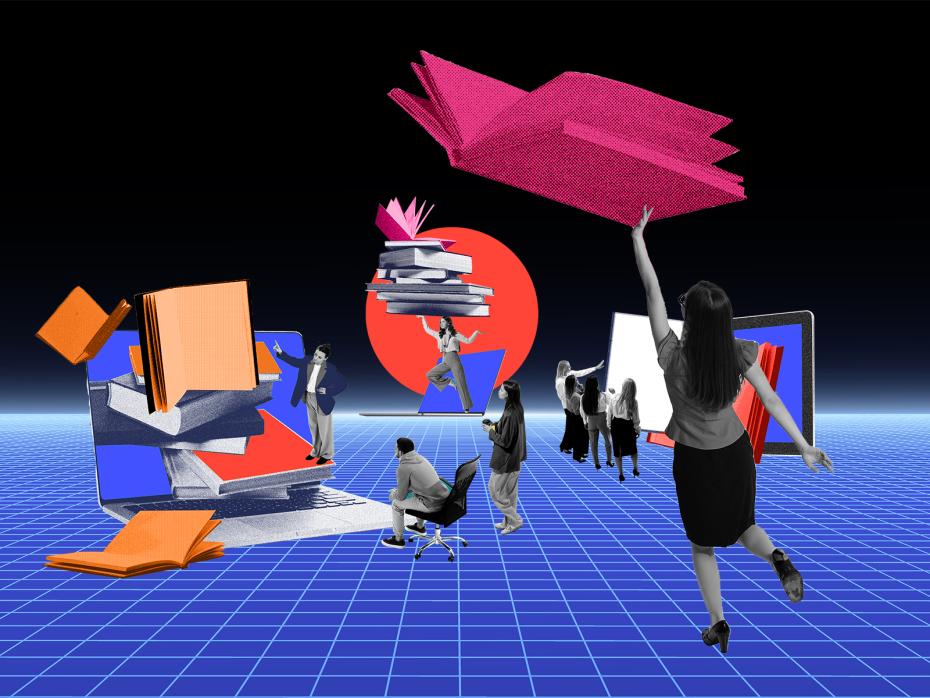
Redefining the university library for 2025 and beyond

You may also like
As higher education undergoes rapid technological, political and social change, the university library remains a cornerstone of any institution, supporting learning, research and outreach. Libraries must ensure access to vast repositories of data and information, provide study skills support to students, assist researchers in searching archives and provide welcoming spaces for diverse communities. But to do this, libraries must keep pace with ever-changing digital tools and content streams, adapt to a changing academic publishing sector, meet evolving student needs and shrinking institutional budgets and, for some, even seek ways to protect valuable datasets at risk of being lost.
In this collection, information services experts from universities around the world explore questions such as how library teams can harness the power of AI to improve their services while managing inevitable risks posed by not yet fully understood tools; how to create spaces in which all students feel they belong; how to advance open access; and how to support broader university outreach efforts.
The university library as a digital content hub
The library has expanded well beyond its bricks and mortar to become a digital curator of vast archives and data repositories. So how should library teams optimise their services for the majority of students and academics who “arrive” online? These resources look at how library teams can embrace digital innovation and navigate new publishing models to keep pace with the changing nature of study and information.
‘Many academic librarians are now effectively digital curators’: Through the advent of the internet, digitisation and artificial intelligence, libraries’ purpose in supporting their users’ success remains unchanged. So, how can academic libraries transform their services to meet evolving needs? Tyler Walters of Virginia Tech explains.
The library’s role in digital education: content is still king: Demonstrate the value of the library’s digital content by promoting the use of digital collections to engage, inspire and enhance learning, writes José Vladimir Burgos Aguilar of Tecnológico de Monterrey.
Higher education library roles explained: Libraries are changing with the times – and so is the librarian’s role. Chris Chan of Hong Kong Baptist University defines how librarians are specialising in the digital era.
We must end the ‘us and them’ standoff between libraries and publishers: University libraries and publishers remain at a damaging impasse over digital textbooks – the solution requires communication, collaboration and openness to big ideas, writes Libby Homer of Anglia Ruskin.
The library and the metaverse: a match made in heaven: A group of librarians and education specialists from Tecnológico de Monterrey share their tips after designing a virtual escape room that inculcates library skills.
Why universities should consider merging library and IT departments: Cultural differences and the need for excellent communication mean that such merging of libraries and information technology departments is not easy, but the outcomes can provide tremendous value, says Ravi Ravishanker of Wellesley College.
THE podcast: how the university library is an agent of change: Often overlooked, university libraries are critical to the teaching and research missions of institutions. They also play a key role in digital innovation and community outreach. Masud Khokar of the University of Leeds and Toni Carter of Athens State University tell us more about how they see their work as agents of change.
The AI library assistant
Information literacy is a core skill for librarians – who must be adept in archiving, finding, curating and critically assessing information from varied resources. These same skills hold the key to using GenAI tools effectively. These resources show how library teams can support AI literacy and how AI technology could shape the library’s future.
Is AI literacy an information skill?: To capitalise on GenAI’s strengths, and understand its limitations, students need to develop their research and critical thinking skills in practical, embedded and subject-specific ways, argue Emily Dott and Terry Charlton of Newcastle University.
AI skills for tomorrow’s university librarians: University librarians need to understand how to guide students and faculty in using AI tools ethically and effectively. In the future, they will be not only information experts but also AI facilitators. Yinlin Chen of Virginia Tech offers advice on laying the groundwork.
The library’s role in student belonging
For students, libraries aren’t just a place to study, but an inclusive hub for connection, socialising and support. Find out how to create a welcoming space central to the student experience.
How to put joy at the centre of the university library: The role of the university library is poised for re-evaluation – not just as an academic hub but as a space where connection, belonging and access can come alive in everyday ways. Pro tip: cake and dogs help. Kayla McNabb of Virginia Tech explains.
What does the future hold for library spaces?: University libraries are evolving fast. From inclusive design to sustainability, Kate Marshall of Nottingham Trent University outlines how institutions can rethink spaces to support future learners and diverse needs.
Seven strategies to turn academic libraries into social organisations: For libraries to secure their future on higher education campuses, they must embrace a model that prioritises partnerships and collaboration, says Sheila Corrall of the University of Pittsburgh.
Building a university library service where everyone feels welcome: Practical actions and meaningful community engagement can support libraries’ work to be more equitable, inclusive and sustainable. Cardiff University staff offer ways to get started.
Three reasons why libraries are key to belonging: The library occupies a unique place in the campus community. Bethany Wilkes of Hong Kong Baptist University details the three reasons it’s integral to the creation of an inclusive learning environment.
Glad you asked: how feedback turns a library into a community of scholarship: Through active and passive efforts to obtain and respond to feedback, academic library professionals can optimise their services while maintaining a lean team. Leslie Sharp and Jason Wright of Georgia Tech's Center for 21st Century Universities show how.
Teaching support from university librarians
What can libraries do to support students in their studies, enhance teaching practices and boost student learning outcomes? From mentoring to decolonisation, find out how library teams can help to close attainment gaps and what insights they can offer on where students need greater support or guidance.
The library’s role in reducing the attainment gap: Read about strategies aimed at closing attainment gaps, such as peer mentoring, inclusive resources and academic skills training to support students, from Nottingham Trent University academics.
How to teach primary source literacy skills in universities: Primary source literacy instruction is instrumental in teaching transferable critical thinking and research skills that help prepare students for their academic careers and real-life scenarios, write Ariana Varela and Michaela Ullmann of the University of Southern California.
Tap the mine of library data to help enhance your courses: University libraries offer a rich well of data for course enhancement teams, on everything from student engagement to which resources they’re using most. Here’s how to make the most of it, from a team at the University of Bedfordshire.
Tips (from a librarian) for creating assignment prompts: A guide to crafting and writing clear assignment instructions that students can understand and follow, from Toni Carter at Athens State University.
Taking digital accessibility from mandate for change to business as usual: To support the student community, digital accessibility needs to be embedded across teaching and learning. Here, Julian Tenney of the University of Nottingham offers insights and steps based on his institution’s experience.
The library’s role in supporting researchers
With the US government’s attacks on key areas of scholarship spiralling out across global higher education, library teams must help academics find new ways to access research. Similarly, research staff have many skills that make them valuable library partners – here’s how the two sectors can mutually benefit one another.
Strategic silencing: how censorship is reshaping scholarly discourse: Restrictions to US databases and scholarly work mean that researchers need new approaches to navigate research absences and silences rather than the more typical information overload, writes Alison Hicks of University College London.
Why university libraries should not overlook research staff: Research assistants and postdocs offer specialised skills and an agile approach to new methodologies, so libraries have much to gain from recognising them as strategic partners, writes Bella Ratmelia of Singapore Management University.
The relationship between university libraries and open access
As champions of readily accessible information, it is no surprise that university libraries have been central to advancing the open access movement. Here, find out how libraries can support their own institutional repositories and help academics navigate the open access publishing process.
Three ways libraries are championing the open access movement: Scholars and researchers should take advantage of libraries’ support of and expertise around open access publishing. Karen Glover of Georgia Tech's Center for 21st Century Universities suggests asking a librarian for help, to protect your work and save you money.
Unwrapping discovery: the importance of institutional repositories: Self-archiving in university repositories is an alternative academic publishing route to gold open access that can boost citations and diversify users accessing scholarly content, writes Nicki Clarkson of the University of Southampton.
As librarians, we should embrace open research: Open access represents a new opportunity, and librarians are ideally placed to implement it. Nazarbayev University’s library team offers their advice.
Sharing qualitative research through open access: Traditional open access repositories are designed for sharing quantitative data. But what about qualitative data – non-numeric information and concepts such as case studies or interview transcripts? That’s where the Qualitative Data Repository comes in. Nathaniel D. Porter of Virginia Tech explains.
The library as a bridge between universities and the local community
Sitting at the heart of a university, libraries can provide a useful and welcoming entry point to surrounding communities. Find out how libraries can take the lead in community outreach work and support pathways into university.
Tips on providing free public access to your university library: A university library should provide a gateway into the institution for surrounding communities. Andrew Barker of Lancaster University shares advice on creating a “library community card” that provides free and open access to the public.
Five tips to enhance your institution’s civic engagement by working with public libraries: Advice to help universities work in partnership with public libraries to reach wider audiences and enhance their civic engagement, from Marge Ainsley and Rachel Heydecker of Carnegie UK.
Walls into walkways: Access to library spaces in preparation for exams is helping Dublin secondary school students find a pathway into university. Dublin City University library staff outline how they’ve made them feel welcome.
If you would like advice and insight from academics and university staff delivered direct to your inbox each week, sign up for the Campus newsletter.


